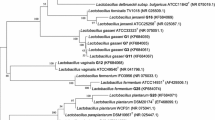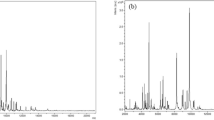Abstract
Corynebacterium amycolatum ICIS 99 was isolated from vaginal smears of healthy women and showed promising results in antimicrobial screenings. Here, we report the draft genome sequence of this strain and analyze its main features to assess its safety and useful properties. The genome is 2,532,503 bp long and contains 2186 CDSs with an average G + C content of 59.0%. Analyses of the ICIS 99 genome revealed the absence of true virulence factors. The genome contains genes involved in the synthesis of secondary metabolites and bacteriocins of the class sactipeptide. In the genome of ICIS 99, we identified a large number of genes responsible for adaptation and survival in the vaginal environment, including acid and oxidative stress resistance genes. The genomic information of ICIS 99 provides a basis for understanding the safety and useful properties of ICIS 99 and for considering it as a potential probiotic strain. The whole genome shotgun project has been deposited at DDBJ/ENA/GenBank under the accession number JAIUSU000000000.




Similar content being viewed by others
Availability of data and materials
All data generated or analyzed during this study are included in this published article and its Supplementary Information files. Additional data are available from the corresponding author upon request.
References
Alcock BP, Raphenya AR, Lau TTY et al (2020) CARD 2020: antibiotic resistome surveillance with the comprehensive antibiotic resistance database. Nucleic Acids Res 48:D517–D525. https://doi.org/10.1093/NAR/GKZ935
Amitai G (2016) Sorek R (2016) CRISPR–Cas adaptation: insights into the mechanism of action. Nat Rev Microbiol 14(2):67–76. https://doi.org/10.1038/nrmicro.2015.14
Aziz RK, Bartels D, Best A et al (2008) The RAST server: rapid annotations using subsystems technology. BMC Genom 9:1–15. https://doi.org/10.1186/1471-2164-9-75/TABLES/3
Balty C, Guillot A, Fradale L et al (2019) Ruminococcin C, an anti-clostridial sactipeptide produced by a prominent member of the human microbiota Ruminococcus gnavus. J Biol Chem 294:14512–14525. https://doi.org/10.1074/JBC.RA119.009416
Baumgart M, Schubert K, Bramkamp M, Frunzke J (2016) Impact of LytRCpsA-Psr proteins on cell wall biosynthesis in Corynebacterium glutamicum. J Bacteriol 198:3045–3059. https://doi.org/10.1128/JB.00406-16/SUPPL_FILE/ZJB999094215SO1.PDF
Blin K, Shaw S, Kloosterman AM et al (2021) antiSMASH 6.0: improving cluster detection and comparison capabilities. Nucleic Acids Res 49:W29–W35. https://doi.org/10.1093/NAR/GKAB335
Bolger AM, Lohse M, Usadel B (2014) Trimmomatic: a flexible trimmer for Illumina sequence data. Bioinformatics 30:2114–2120. https://doi.org/10.1093/BIOINFORMATICS/BTU170
Bush MJ (2018) The actinobacterial WhiB-like (Wbl) family of transcription factors. Mol Microbiol 110:663–676. https://doi.org/10.1111/MMI.14117
Collins MD, Burton RA, Jones D (1988) Corynebacterium amycolatum sp. nov. a new mycolic acid-less Corynebacterium species from human skin. FEMS Microbiol Lett 49:349–352. https://doi.org/10.1111/j.1574-6968.1988.tb02755.x
Couvin D, Bernheim A, Toffano-Nioche C et al (2018) CRISPRCasFinder, an update of CRISRFinder, includes a portable version, enhanced performance and integrates search for Cas proteins. Nucleic Acids Res 46:W246–W251. https://doi.org/10.1093/NAR/GKY425
Esteban J, Nieto E, Calvo R et al (1999) Microbiological characterization and clinical significance of Corynebacterium amycolatum strains. Eur J Clin Microbiol Infect Dis 18:518–521. https://doi.org/10.1007/S100960050336
Gladysheva IV, Cherkasov SV, Khlopko Y (2017) Antibacterial activities of metabolites from Corynebacterium spp. strains isolated from the reproductive tract of a healthy woman against human pathogenic bacteria. Int J Pharma Bio Sci. https://doi.org/10.22376/IJPBS.2017.8.3.B549-556
Ikeda M, Takeno S (2013) Amino acid production by Corynebacterium glutamicum. In: Yukawa H, Inui M (eds) Corynebacterium glutamicum Microbiology monographs, vol 23. Springer, Berlin, Heidelberg. https://doi.org/10.1007/978-3-642-29857-8_4
Lee I, Kim YO, Park SC, Chun J (2016) OrthoANI: an improved algorithm and software for calculating average nucleotide identity. Int J Syst Evol Microbiol 66:1100–1103. https://doi.org/10.1099/IJSEM.0.000760/CITE/REFWORKS
Lehmann KB (2016) Atlas und Grundriss der Bakteriologie und Lehrbuch der speziellen bakteriologischen Diagnostik. https://doi.org/10.5962/BHL.TITLE.117384
Liu B, Zheng D, Jin Q et al (2019) VFDB 2019: a comparative pathogenomic platform with an interactive web interface. Nucleic Acids Res 47:D687–D692. https://doi.org/10.1093/NAR/GKY1080
Meier-Kolthoff JP, Auch AF, Klenk HP et al (2013) Genome sequence-based species delimitation with confidence intervals and improved distance functions. BMC Bioinform 14:60. https://doi.org/10.1186/1471-2105-14-60
Pascual C, Lawson PA, Farrow JAE et al (1995) Phylogenetic analysis of the genus Corynebacterium based on 16S rRNA gene sequences. Int J Syst Bacteriol 45:724–728. https://doi.org/10.1099/00207713-45-4-724
Petkau A, Stuart-Edwards M, Stothard P, van Domselaar G (2010) Interactive microbial genome visualization with GView. Bioinformatics 26:3125–3126. https://doi.org/10.1093/bioinformatics/btq588
Reddy BS, Chaudhury A, Kalawat U et al (2012) Isolation, speciation, and antibiogram of clinically relevant non-diphtherial Corynebacteria (Diphtheroids). Indian J Med Microbiol 30:52–57. https://doi.org/10.4103/0255-0857.93033
Swierczynski A, Ton-That H (2006) Type III pilus of corynebacteria: pilus length is determined by the level of its major pilin subunit. J Bacteriol 188:6318. https://doi.org/10.1128/JB.00606-06
Tauch A, Burkovski A (2015) Molecular armory or niche factors: virulence determinants of Corynebacterium species. FEMS Microbiol Lett. https://doi.org/10.1093/FEMSLE/FNV185
Tauch A, Sandbote J (2014) The family Corynebacteriaceae. Prokaryotes Actinobacteria. https://doi.org/10.1007/978-3-642-30138-4_187
Van Heel AJ, De Jong A, Song C et al (2018) BAGEL4: a user-friendly web server to thoroughly mine RiPPs and bacteriocins. Nucleic Acids Res 46:W278–W281. https://doi.org/10.1093/NAR/GKY383
Wennerhold J, Bott M (2006) The DtxR regulon of Corynebacterium glutamicum. J Bacteriol 188:2907–2918. https://doi.org/10.1128/JB.188.8.2907-2918.2006/SUPPL_FILE/SUPPLEMENTAL_MATERIAL_WENNERHOLD_AND_BOTT.PDF
Wick RR, Judd LM, Gorrie CL, Holt KE (2017) Unicycler: resolving bacterial genome assemblies from short and long sequencing reads. PLoS Comput Biol 13:e1005595. https://doi.org/10.1371/JOURNAL.PCBI.1005595
Ziemert N, Podell S, Penn K et al (2012) The natural product domain seeker NaPDoS: a phylogeny based bioinformatic tool to classify secondary metabolite gene diversity. PLoS ONE 7:e34064. https://doi.org/10.1371/JOURNAL.PONE.0034064
Acknowledgements
The authors are grateful to Marina Ignatenko, employee of the Center for Revealing and Support of Gifted Children “Gagarin”, Orenburg region, Russia, for conducting scanning electron microscopy of the samples.
Funding
This study was conducted as part of a collaborative research effort between the Center for Revealing and Support of Gifted Children “Gagarin” and the Institute of Cellular and Intracellular Symbiosis, Ural Branch of the Russian Academy of Sciences, Orenburg, Russia. No funding was received for conducting this study.
Author information
Authors and Affiliations
Contributions
IVG designed a study. VYK carried out the experimental design. YAK carried out bioinformatic analysis. IVG and SVC analyzed data and prepared the manuscript. All authors have read and approved the final manuscript.
Corresponding author
Ethics declarations
Conflict of interest
The authors have no financial conflicts of interest to declare.
Additional information
Communicated by Erko Stackebrandt.
Publisher's Note
Springer Nature remains neutral with regard to jurisdictional claims in published maps and institutional affiliations.
Supplementary Information
Below is the link to the electronic supplementary material.
Rights and permissions
About this article
Cite this article
Gladysheva, I.V., Khlopko, Y.A., Cherkasov, S.V. et al. Genome sequence of Corynebacterium amycolatum ICIS 99 isolated from human vagina reveals safety and beneficial properties. Arch Microbiol 204, 226 (2022). https://doi.org/10.1007/s00203-022-02852-7
Received:
Revised:
Accepted:
Published:
DOI: https://doi.org/10.1007/s00203-022-02852-7




